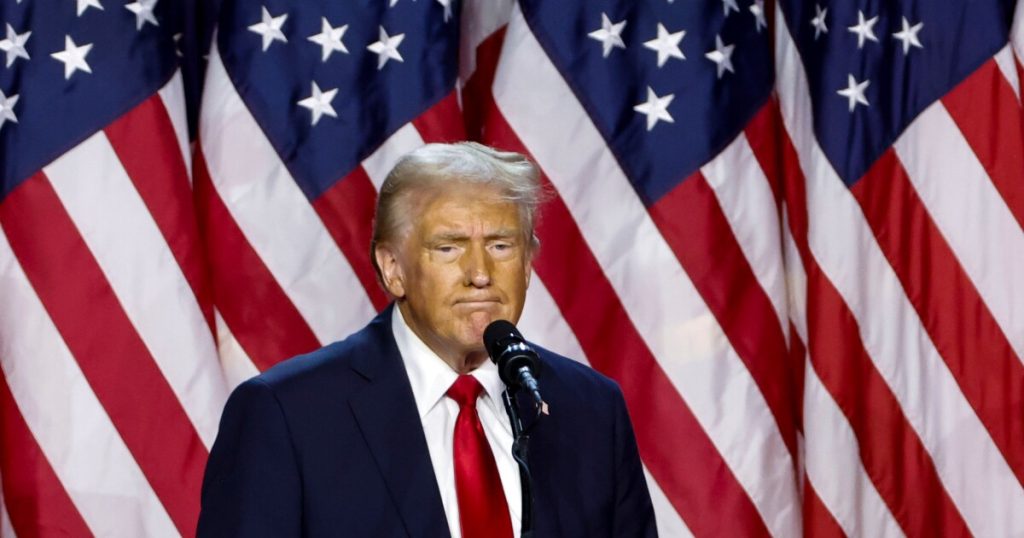Donald Trump was elected the president of the United States. The Associated Press called the race at 6:15 a.m. on Monday.
Trump put up a strong showing on Tuesday, gaining ground in nearly all corners of the country. He claimed Georgia, Pennsylvania and Wisconsin, all swing states he lost in 2020.
“We overcame obstacles that nobody thought possible,” Trump said in his victory speech in West Palm Beach, Fla.
He told supporters Wednesday morning that he had won “an unprecedented and powerful mandate.”
Republicans also picked up a few Senate seats, flipping the upper chamber. Many House races remained too close to call as of Wednesday morning.
While both parties’ 2024 presidential campaigns made few specific prescriptions in the way of financial policy, the result will have a huge impact on the direction of the economy and bank regulation for the next four years.
“Like most presidents, neither Harris nor Trump have very strong views on financial regulation that we’re aware of,” Ian Katz, managing director at Capital Alpha, told American Banker earlier this week. “So that means most policy will depend on who exactly the regulators are.”
A Donald Trump win will likely mean some of the same financial regulatory policies his administration enacted in his first term, but alongside a highly protectionist ideology that would mean high tariffs and deportations that could unsettle employment figures in the country.
Some bankers, especially those who helm small banks, said a future Trump administration won’t necessarily look like the first one when it comes to the prospects of small banks.
“The idea was that taxes were going to go down and banks were going to make more money, and probably as important, the regulatory environment might ease a little bit,” said Patrick Ryan, CEO of First Bank in New Jersey and chair of the New Jersey Bankers Association. “There’s some that are theorizing that it might have a similar impact this time around, but that’s a little hard to say.”
Voters also weighed in on several races that could sway the direction of bank policy on Capitol Hill.
Sen. Sherrod Brown, D-Ohio, lost his bid for reelection in the U.S. Senate. This means that the top Democratic spot on the committee is up for grabs.
Sen. Jack Reed, D-R.I., is the most senior Democratic member of the committee after Brown, but is largely expected to remain the top Democrat on Senate Armed Services.
That would have left, in order of seniority, Sen. Jon Tester, D-Mont., who lost his own race, to head Democrats on the committee. Up next are Sens. Mark Warner, D-Va., and Elizabeth Warren, D-Mass.
Both Tester and Warner are relatively moderate on banking issues. Both contributed heavily to the 2018 tailoring law on bank regulations. Should Warner not want the spot, Warren would be next in line for Democratic leadership of the committee, setting up an intense clash with Wall Street and banking interests.
Rep. Adam Schiff, D-Calif., won the Senate seat in California vacated by fellow Democrat Sen. Dianne Feinstein. Schiff is one of the House’s most staunch Democratic crypto allies, and will likely take up a seat on the Senate Banking Committee that’s been long held by a California lawmaker.
Sen. Elizabeth Warren, D-Mass., will return to the Senate, where she’s expected to continue to be a strong progressive voice on banking issues.
“We beat the big banks on Wall Street and cracked down on overdraft and junk fees,” Warren said at her victory speech Tuesday evening. “I led the charge to create the Consumer Financial Protection Bureau — go CFPB — and now, with a cop on the beat, big banks have been forced to return more than $20 billion directly to consumers they cheated.”
Stalwart Republicans on banking issues in the House soared easily to victory on Tuesday. Reps. French Hill of Arkansas and Andy Barr of Kentucky each had their races called relatively early in the evening. Both are contenders for the top Republican spot on the House Financial Services Committee with the retirement of Rep. Patrick McHenry, R-N.C..
— Kyle Campbell, Catherine Leffert, Carter Pape, Ebrima Santos Sanneh, Polo Rocha, Kevin Wack and John Heltman contributed to this report.

